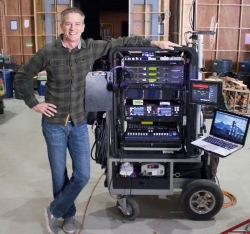
Emmy award-winning production sound mixer Phillip W. Palmer, CAS, began his career in Dallas, some 25 years ago. Some of his credits include the entire six-season run of the hit FOX television series, Glee (where he won the Primetime Emmy for Outstanding Sound Mixing), Better Call Saul, Battle Los Angeles, Star Trek, Entourage (TV Series) and the upcoming independent movie Wakefield, starring Bryan Cranston and Jennifer Garner.
To deliver the sound that has become synonymous with his work, Palmer relies on Sound Devices for all of his recording needs.
Palmer’s initial attraction to Sound Devices was the use of Dante for I/O.
“I had been struggling with I/O paths, track counts, and options with other products available at the time, and the PIX 260i looked to be a welcome solution for location sound recording,” says Palmer. “Using network protocol-based I/O was new to production sound mixers in the field at the time. It was getting some traction in larger format installations, touring and studio environments, but not so much in our world of location sound recording for film and television.
“Being able to access all the functions and menu items of each recorder via the PIXNET web server has added to its ease of use. I have been very happy with the PIX 260i, as its features make it a viable cart-based recorder. Similar to Sound Devices’ portable gear, the stability and performance of the rack-mount PIX 260i has been excellent.”
With his current setup, Palmer uses two PIX 260i’s grouped as primary and backup recorders. “Each machine is identical in setup with CompactFlash and SSD cards in both,” adds Palmer. “When in a clean or studio environment, I use a laptop to access PIXNET, metadata entry, track arming and all that PIXNET provides. When I’m on location and in unfavorable conditions, I have a keyboard mounted in a drawer under the recorders to access all the menus and functions.”
Palmer’s rig is fairly substantial for a location sound recording cart. Integrated into his cart are two PIX 260i decks, three Lectrosonics Venue receivers, video monitors for three cameras, a Denecke GR-2 Master Clock Time Code Generator, backup hard drives, a keyboard, three IFB transmitters, a NETGEAR router, patchbays, an Apple iPad with PureBlend’s MovieSlate 8 iOS app for sound reports, and a Yamaha O1V96 digital mixing console.
As for metadata, Palmer uses the track name/scene/take function primarily in the PIX 260i. Due to the volume of assets that post production must manage for each project, it is imperative for Palmer that the audio file names have the scene/take information. And with the track counts rising with each scene, having the track name in the metadata is also essential.
“I can say that using the PIX 260i has made my job and my setup easier,” says Palmer. “Implementing Dante has added a level of I/O to my system that I didn’t anticipate when I first built it. I frequently use a computer in the Dante network for playback purposes and now I have that all patched to and from the console and recorders via Dante rather than traditional physical connections. Essentially, the system within my production sound recording rig is simplified, but with much more flexibility due to the introduction of the PIX 260i recorders. I rely on them for all of my sound recording processes. With this new setup, I can do so much more.”
Although Sound Devices PIX 260i is now discontinued, it is still supported and in use in many production applications worldwide. Sound Devices expanded on the PIX 260i’s success with a range of network-connected video & audio recorders.
Like their predecessor, both the Video Devices PIX 270i and 970 are multi-drive, networkable recorders with the ability to record up to 64 channels of MADI and/or Dante audio. The PIX 270i provides frame-synchronized recording and playback capabilities and extensive video I/O for flexibility. Both of these next-generation, rack-mount recorders offer significant advantages and time savings to production workflows.
